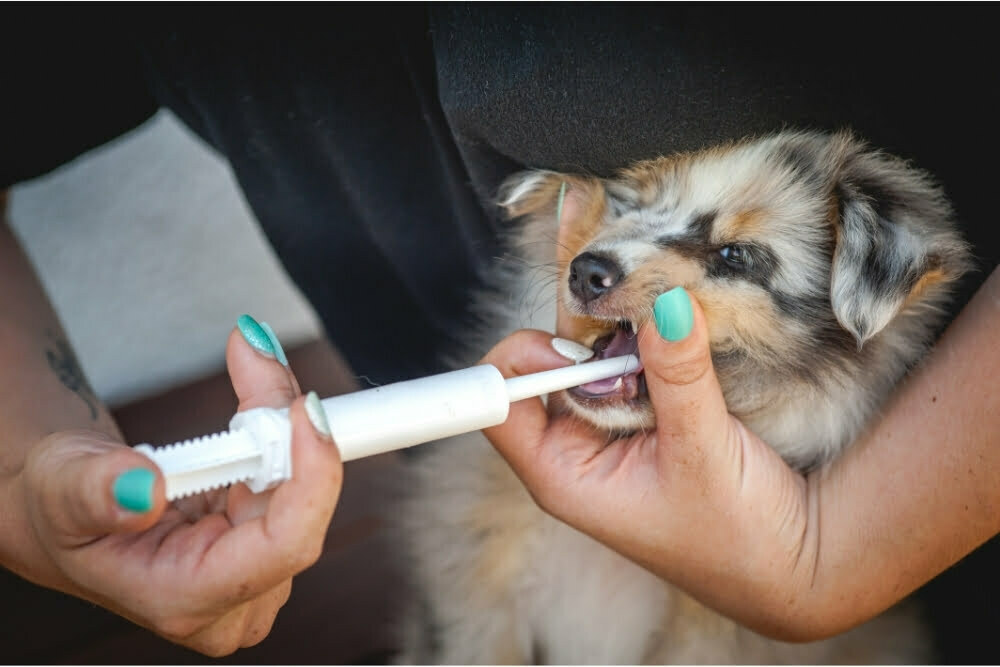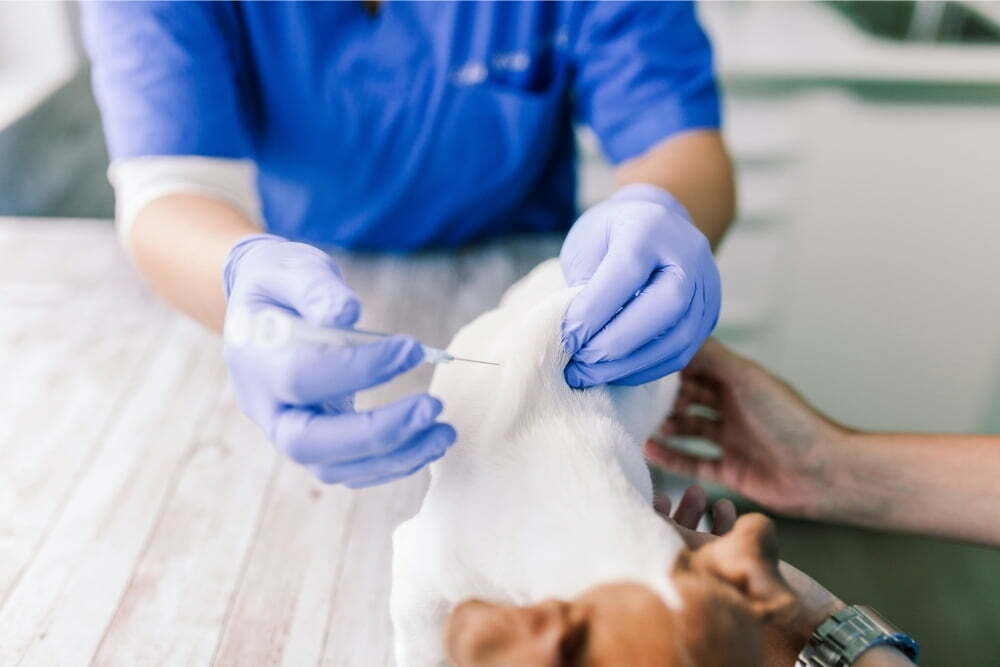
Owning a puppy is such a wonderful experience. It is fun playing with them, having lots of hugs, training them, and watching them grow. With owning a puppy, however, comes the responsibility of caring for their health.
Puppies are quite susceptible to catching worms. While this may not be something that is a pleasant topic to research, you will want to ensure you know all the signs and symptoms to look for.
If left untreated, worms can lead to a whole host of health issues. As an owner, it is your responsibility to ensure you are correctly treating the worms, and staying on top of the medication needed to treat this.
In this article, we have covered everything you will need to know about puppy worming. From how long it takes the worms to leave the stools, to how to effectively treat this problem.
What Are Worms?
To begin with, you will want to be aware of what worms are. Being educated on the different types of worms will better assist you when seeing the advice of a vet.
Worms are intestinal parasites that live in a dog’s digestive tract.
There are a number of ways in which a puppy can contract worms, and they can cause a number of different symptoms. There are four main types of worms that can infect a puppies digestive system:
Roundworms
Roundworms are some of the most common types of worms that can live in a puppy’s digestive system. There are two different types a dog can contract, being long and stringy – toxascaris leonina, and toxocara canis. They are white, and resemble spaghetti.
Toxascaris leonina worms remain in the dog’s digestive tract and will absorb the nutrients needed by your dog. Toxocara canis are more serious as they will burrow into a dog’s body and can infect the lungs. Once they have infected the lungs, they reenter the dog’s digestive system.
Tapeworms
Tapeworms are another common type of worm that can affect puppies. They secure themselves to the wall of a dog’s small interest and eat away at the nutrients a dog is trying to absorb.
Unlike roundworms, tapeworms are fairly long, being around half a foot, though they can be longer than this. When they leave the body, the worm is typically broken up, and will resemble white grains of rice in the stool.
While these worms are unpleasant, they do not harm the dog in the same way as other parasites. Though they still need to be treated and eradicated quickly.
Hookworms
When thinking about puppies in particular, you will need to be aware of how dangerous hookworms can be.
In puppies, if they are not treated, they quickly become fatal. This is because they absorb a lot of nutrients, which leave the puppy left with none.
They also move towards the lung and are reentered into the dog’s digestive system as they mature.
These worms are difficult to see in the dog’s stools, which is why it is essential to take your puppy to the vet if you notice symptoms such as bloody diarrhea, weakness, and weakness.
Whipworms
Whipworms are not as serious as other types of worms, but you will still need to treat your dog to eradicate them. These worms cling to the large intestine and take small amounts of nutrients from a dog’s body.
As with hookworms, they can typically only be diagnosed under the microscope in a stool sample.
Why Has My Puppy Got Worms?
There are many ways your puppy can contract worms. While it may be quite worrying to see, it is quite common, especially in puppies.
If your puppy has worms, this does not mean you are a bad owner, they can pick them up fairly easily. However, you will want to ensure you get rid of them as soon as possible.
The most common ways a puppy can get worms are:
Their Mother
One of the most common ways puppies can catch worms is through their mother. If the mother is infected with hookworms or roundworms, these can travel into the uterus and infect the puppies before they are born. Worms can also be passed through the mother’s milk.
As this is quite common, it is recommended that the mother is wormed throughout the pregnancy and the puppies are wormed regularly too. You should always chat to your vet if you are unsure of the correct doses to give.
Fleas

Another common way puppies can get worms is due to fleas. Fleas are another parasite that can infect dogs, and they live in the fur of the dog.
While you should be treating fleas on a monthly basis, it is important to worm your dog regularly too, especially if you spot any fleas.
When fleas live in the fur, they lay hundreds of flea eggs per day. If injected by your dog, these eggs can cause infection of tapeworm if the eggs contain this parasite.
Infected Animals
If your dog comes into contact with another animal that is infected with worms, they can potentially catch them from the animal. This typically happens if your dog eats an animal that is infected, such as a bird or a mouse. This can pass on tapeworm.
Infected Soil or Stools
In the same vein, if your dog ingests infected soil or stools, this can cause them to become infected with worms too. In addition to this, playing in infected soil can cause your dog to accidentally ingest the parasites too. Caution should always be taken when outdoors to help prevent this.
Signs of Worms
If your dog is infected with worms, it is likely that you will become quickly aware of this, especially if there are worms present in your dog’s stool. However, as we have covered above, worms are not always present in the stool.
Given this, you should be aware of all the potential signs of infection. This will help you to treat your dog as quickly as possible.
Your dog may experience one of these symptoms, or multiple. Some possible signs are as follows:
- Worms in puppy’s stools
- Worms around puppy’s rear end
- Diarrhea
- Bloody stools
- Scratching, biting, or rubbing of rear end
- Vomiting
- Swollen stomach
- Dehydration
- Weakness
- Cough
- Deficiencies
- Lethargic behavior
- Cough (hook and roundworms)
- Lack of, or increased appetite
- Weight loss
As you can see, there are many symptoms of worms, some which are more noticeable than others.
If your dog is suffering from the symptoms severely, you will want to contact your vet as soon as possible.
If your puppy has any of the above symptoms, we would recommend treating them for worms.
How To Get Rid Of Worms
In order to get rid of worms, you will need to provide your dog with a worming treatment. This can be purchased from your local vet.
As puppies are young, it is important that you ensure you are purchasing a puppy wormer and that it is the correct weight for your puppy.
There are different options available depending on the age of the puppy and the weight. For example, syrups, spot on treatment and tablets. Different worms may require different treatment. Given this is important to ensure you speak to a professional.

How Does Dog Worming Treatment Work?
The treatment is successful as it will kill the worms that are present in the dog’s digestive tract.
As many treatments work by killing the parasite in the digestive system, it is common to notice that your dog is passing a lot of worms after the treatment has been administered.
This is normal and nothing that you should be concerned about, the worms present in the stool after the treatment are dead, and need to pass through the digestive system in order for your puppy’s body to be rid of them.
How Long Does It Take To Get Rid Of Worms?
Once you have given the puppy worming treatment, it will begin to work instantly. Given this, you should start to notice a difference in your dog fairly quickly.
After around 6 hours of the treatment being given, it will start to kill and remove the worms. After the treatment has been given, in the next few stools your puppy passes you will notice that in many cases the worms will be passed.
How Often Should You Give Your Puppy Worming Treatment?
If your puppy recently has suffered from worms, in many cases, a follow-up dose is recommended a few weeks after the initial treatment. This is to ensure that the worms have completely left your dog’s digestive system.
Some wormers are not successful in killing the worm eggs. Given this, a second dose a few weeks later can help to get rid of any new worms that have hatched.
In general, when a puppy is born, they should be wormed every two weeks with the correct treatment up until they are 12 weeks.
This typically occurs on weeks 2, 4, 6, 8, and 12. As we have mentioned above, this is because puppies are prone to having worms, especially in the first few months.
After this period, you should look to treat your puppy every three months to help prevent worms from occurring.
Can Worms Be Passed On To Humans?
The majority of the worms that infect dogs are zoonotic. This means that it is possible for humans to pick up worms from their dog.
While this is not very common, it can happen, especially if you are not regularly washing your hands.
Typically, humans will become infected with worms in the same way as dogs, through ingesting worm eggs. Given this, if your dog has worms, or you suspect this, cleanliness is essential.
You will want to thoroughly wash your hands after petting your dog, or picking up its stools. In addition to this, you will want to avoid your dog licking you as much as possible to help prevent infection.
Care should also be taken if you have children, as they can become infected with worms too.
Will Dog Worm Eggs Survive In My House?
Yes, unfortunately if there are worm eggs present in your yard or home, they can survive for some time. This is a problem as it poses the risk of your dog becoming reinfected or your potentially being infected too.
Given this, it is important to maintain a good level of hygiene and ensure you are cleaning surfaces and bedding your dog has come into contact with thoroughly, until you are happy that the infection is no longer present. This is essential as some eggs can survive for several months especially in carpets.
Summary
We hope that this article has been helpful in teaching you everything you need to know about worms and your puppy.
While it is not something that is pleasant to discuss, it is important that you educate yourself on this topic to correctly treat your dog.
If you suspect your puppy has worms, you will want to seek veterinarian advice and treatment as soon as possible to get rid of the parasite. You will likely need to administer a follow-up treatment too.
Worms are fairly easy to treat on the whole. The most important thing to remember is that you should keep a good level of cleanliness in your home to help prevent reinfection or the worms passing on to your and your family.
